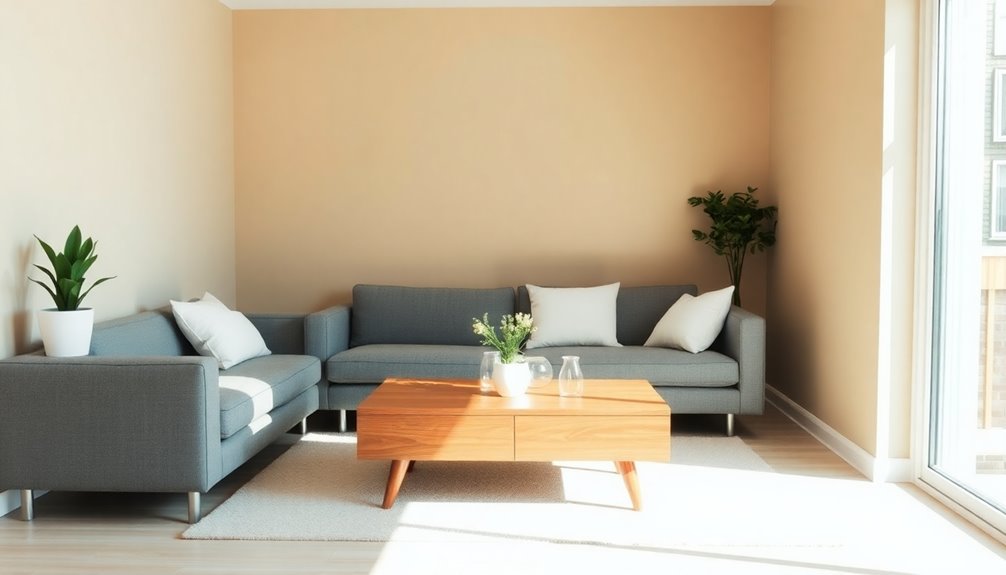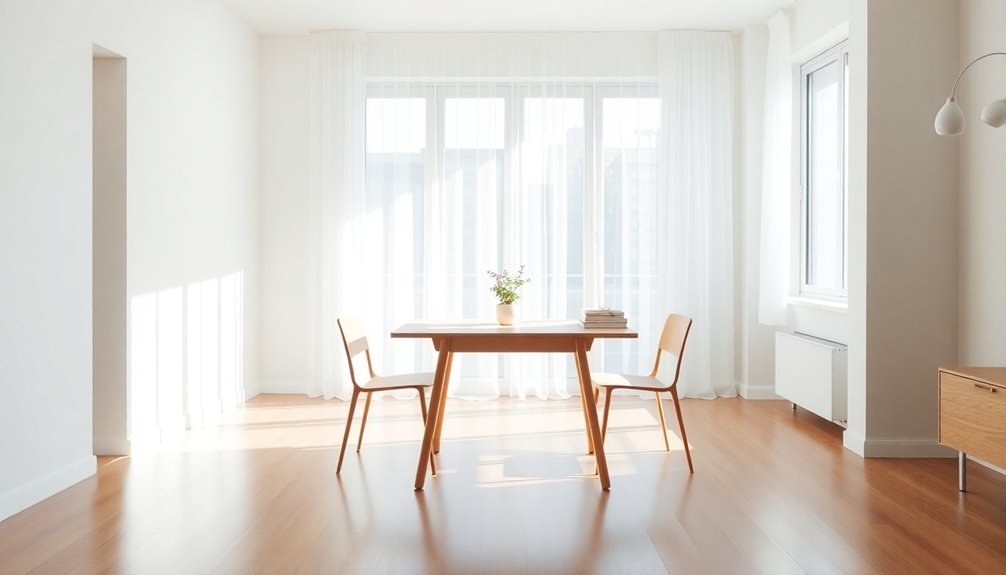By adopting a minimalist lifestyle, you cut unnecessary expenses and reduce clutter, which saves you money. Selling unused items, canceling unused subscriptions, and simplifying your wardrobe lower costs and free up capital for smarter investments. Living in a smaller space and focusing on experiences rather than possessions helps you spend less and enjoy more. Building mindful spending habits and prioritizing long-term wealth can transform your finances, and you’ll discover even more ways to save as you continue to explore these strategies.
Key Takeaways
- Reducing possessions lowers costs on storage, cleaning, and impulse purchases.
- Simplifying your wardrobe minimizes clothing expenses and extends the lifespan of high-quality items.
- Canceling unused subscriptions and digital services cuts recurring expenses.
- Focusing on essential, durable products reduces frequent replacements and waste.
- Prioritizing experiences over material goods saves money and promotes a more meaningful lifestyle.
Reducing Clutter and Its Financial Benefits

Have you ever wondered how much money you could save by decluttering your home? Clearing out unused items can lead to a profitable garage sale, turning clutter into cash. Plus, reducing physical possessions makes your space more organized and easier to maintain. Digital decluttering is just as important—delete unused apps, unsubscribe from unnecessary emails, and tidy your online files. This not only frees up storage but also helps you avoid costly digital subscriptions you no longer need. By cutting down on clutter, you’ll spend less on storage solutions, cleaning supplies, and impulsive purchases. Simplifying your environment enhances your financial health and mental clarity. Additionally, understanding the different types of clutter, such as physical and digital, can help you develop targeted decluttering strategies. Incorporating minimalist principles into your lifestyle can further streamline your possessions and reduce expenses. Ultimately, decluttering creates a more streamlined, budget-friendly lifestyle that’s easier to sustain long-term.
Cutting Unnecessary Subscriptions and Memberships

Take a close look at your subscriptions and memberships to see which ones you’re truly using. If you haven’t accessed a service in months, it’s probably time to cancel. Being honest about your usage helps you save money and simplify your life. Additionally, reviewing your subscription management can reveal opportunities to cancel unused or redundant services, further streamlining your expenses. Regularly monitoring your recurring payments ensures you stay aware of ongoing charges and avoid unnecessary costs. Exploring the resale value of items like electric bikes can also motivate you to sell unused equipment and recover some expenses. Utilizing privacy policies to understand how your data might be shared can also help you make more informed decisions about which services to keep. Recognizing relationship warning signs, such as emotional distance or withdrawal, can help you prioritize healthier and more supportive subscriptions—like positive relationships—that contribute to your well-being.
Identify Unused Services
To simplify your life and cut costs, start by reviewing all your subscriptions and memberships. Conduct a thorough subscription audit to identify unused services draining your money. Look at recurring payments and ask yourself if you’ve genuinely used each one lately. Here’s a visual reminder:
| Service | Monthly Cost | Usage Frequency |
|---|---|---|
| Streaming | $15 | Once a month |
| Gym | $40 | Never visited |
| Magazine | $10 | Every month |
If you notice services you no longer use, don’t hesitate to make service cancellations. Removing unused subscriptions frees up cash and declutters your financial life, making it easier to focus on what truly matters. Regular reviews ensure you’re not paying for things you don’t need. Paying attention to subscription effectiveness can help you determine which services genuinely add value to your life. Additionally, practicing mindful consumption can help prevent future unnecessary expenses. Embracing a minimalist mindset encourages intentional spending and reduces impulse purchases, further supporting your financial goals. Being aware of cookie categories and your consent preferences can also help you maintain control over your online privacy and avoid unnecessary data sharing. Moreover, choosing brands with a reputation for trustworthiness ensures that your investments in services are reliable and worth the cost.
Assess Actual Usage
Evaluating your actual usage is essential for cutting unnecessary subscriptions and memberships. Start by reviewing your bills and account statements to identify recurring charges. Ask yourself if you truly need each service, especially if you haven’t used them recently. A digital detox can help you disconnect from endless notifications and evaluate whether digital subscriptions are worth keeping. Consider downsizing to minimal tech accessories—fewer devices or simpler options—to reduce costs and clutter. Cancel subscriptions that no longer serve your needs or bring value. Tracking your usage over a month reveals patterns and highlights which memberships are unnecessary. By focusing only on what you genuinely use, you free up money and mental space, making your life more minimalist and financially efficient. Additionally, understanding the costs involved in pet ownership can help you decide which animals truly fit into your simplified lifestyle. Incorporating mindful spending strategies can further enhance your financial and mental clarity by encouraging intentional choices about expenditures. Being aware of perishable food storage practices can help you avoid waste and unnecessary expenses on spoiled items. Practicing spiritual guidance can also support your journey toward a more intentional and conscious lifestyle. Moreover, reviewing your somatic therapy sessions and techniques can help ensure your investments in emotional healing are effective and aligned with your needs.
Simplifying Your Wardrobe to Save Money

Creating a capsule wardrobe with a few versatile essentials can reduce clutter and save you money. Prioritize quality pieces over quantity to guarantee your clothes last longer and look better. Regular closet audits help you identify what no longer serves you, making it easier to maintain a streamlined wardrobe. Incorporating exfoliation techniques, such as using glycolic acid, can also improve your skin’s appearance, complementing your minimalist lifestyle.
Capsule Wardrobe Essentials
A capsule wardrobe simplifies your life by focusing on a small selection of versatile, high-quality pieces that can be mixed and matched easily. To keep it fresh, choose items that align with current fashion trends and seasonal colors, so your wardrobe feels relevant without overhauling everything. Stick to classic staples like neutral-toned pants, a white button-up shirt, and a versatile blazer. These pieces form the foundation and can be paired with accessories or layered for different looks. Limit yourself to a few well-chosen items per category, like tops, bottoms, and outerwear. This approach reduces clutter and decision fatigue, saving you money by preventing impulse buys driven by fleeting trends. Quotes from visionaries can serve as powerful reminders to stay committed to your minimalist goals and inspire intentional living. Your wardrobe becomes more intentional, functional, and budget-friendly. Incorporating environmentally conscious choices can also inspire a cohesive aesthetic that enhances your home’s simplicity and charm. For instance, adding simple wooden accents or vintage-inspired decor can create a warm and inviting atmosphere that complements your minimalist lifestyle. Additionally, selecting sustainable clothing options aligns with your goal of reducing excess and supporting eco-friendly practices.
Quality Over Quantity
Focusing on quality over quantity transforms your wardrobe into a collection of durable, timeless pieces that last longer and look better. Instead of buying many low-quality items, invest in fewer high-quality garments from luxury brands known for craftsmanship. This approach enhances your style while reducing overall spending. Prioritize items with classic cuts and versatile colors that won’t go out of fashion. Building brand loyalty with trusted labels ensures consistency and durability. Additionally, adopting ethical considerations in your purchasing decisions can lead to more sustainable and responsible wardrobe choices. Incorporating sustainable shopping practices can further reinforce your commitment to responsible consumption and minimize waste. Being mindful of supporting sustainable brands ensures your wardrobe aligns with environmentally conscious values. Recognizing the importance of long-term value guides smarter purchasing decisions that benefit both your wardrobe and the planet. Moreover, understanding cost behavior analysis can help you identify the most cost-effective options when selecting quality clothing.
Regular Closet Audits
Have you ever wondered how often your wardrobe truly serves your needs? Regular closet audits help you evaluate your seasonal wardrobe and identify items you no longer wear. By doing this every few months, you prevent clutter and make mindful clothing choices. During these audits, consider clothing recycling options for items in good condition. This process saves money by reducing unnecessary purchases and extends the life of your wardrobe. Use the table below to assess your clothes:
| Item Category | Keep | Donate/Sell | Recycle/Repurpose |
|---|---|---|---|
| Seasonal wardrobe | |||
| Frequently worn | |||
| Rarely worn |
Regular audits keep your wardrobe streamlined, saving money and fostering a minimalist lifestyle.
Embracing a Frugal Lifestyle Through Minimalism

Ever wondered how simplifying your life can lead to significant savings? Embracing a frugal lifestyle through minimalism helps you cut unnecessary expenses and focus on what truly matters. By adopting a minimalist mindset, you can prioritize budget-friendly travel, saving money while exploring new places affordably. Eco-conscious shopping becomes easier, as you seek quality over quantity and reduce impulse buys. To deepen your frugality, consider these steps:
Simplify your life with minimalism—cut costs, focus on what truly matters, and enjoy more meaningful, budget-friendly experiences.
- Limit discretionary spending by setting clear financial goals.
- Opt for experiences over things, like local adventures or community events.
- Choose sustainable products that last longer, saving money in the long run.
Minimalism encourages thoughtful consumption, helping you live well without overspending. This approach not only saves money but also fosters a more meaningful, intentional lifestyle.
Decreasing Energy Costs With Less Electronics and Appliances

Reducing your energy costs becomes easier when you cut back on unnecessary electronics and appliances. Start by unplugging devices when not in use, as many draw power even when off. Invest in energy-efficient appliances that consume less electricity while performing the same tasks, saving you money over time. Consider switching to renewable energy options, like installing solar panels or subscribing to green energy programs, to further lower your bills and reduce your carbon footprint. Limit the number of gadgets and appliances you keep, focusing only on essentials. This not only cuts energy consumption but also simplifies your living space. By making these changes, you’ll notice a significant decrease in energy costs and a more sustainable lifestyle.
Making Smarter Purchases by Prioritizing Quality Over Quantity

When you choose quality over quantity, you’ll find your purchases last longer and serve you better. Opt for items made with durable materials and versatile designs that can adapt to different needs. This approach helps you build a minimalist lifestyle that’s both practical and sustainable.
Durable Materials Matter
Choosing durable materials is essential for minimalist living because investing in quality items often leads to fewer replacements and less waste. Prioritizing sustainable materials guarantees your purchases support the environment while offering long-lasting durability. When selecting items, consider these factors:
- Opt for natural fibers like hemp or organic cotton, known for their resilience and eco-friendliness.
- Choose metals such as stainless steel or solid wood, which resist wear and tear over time.
- Look for products with reinforced seams or sturdy construction, guaranteeing longevity and reducing the need for frequent replacements.
Invest in Versatile Items
Investing in versatile items allows you to make smarter choices by focusing on quality rather than quantity. Choose multi-purpose furniture that can serve multiple functions, reducing clutter and saving money. Look for eco-friendly materials that are durable and sustainable, ensuring your purchases last longer and have less environmental impact. For example, a sofa bed or an extendable dining table can adapt to different needs, eliminating the need for extra pieces. High-quality, versatile items may cost more upfront, but they save you money over time by lasting longer and reducing the need for replacements. Prioritizing items that are functional, durable, and eco-friendly helps you create a minimalist space that’s both practical and mindful of the environment.
Living in a Smaller Space to Lower Housing Expenses

Living in a smaller space can considerably cut your housing expenses and make minimalist living more achievable. When you downsize, you often benefit from rent reduction and lower property maintenance costs. Smaller homes typically have lower utility bills and require less upkeep, saving you money over time. To maximize savings, consider these options:
- Choose a compact, efficient layout to minimize space and reduce rent.
- Opt for a location with affordable rent and lower property taxes.
- Keep maintenance simple by maintaining fewer rooms and fewer appliances.
These strategies help you cut costs directly associated with housing, making it easier to sustain a minimalist lifestyle while keeping your expenses manageable. Downsizing isn’t just about less space; it’s about smarter, more economical living.
Focusing on Experiences Rather Than Material Goods

Instead of spending money on accumulating more possessions, focusing on experiences allows you to create meaningful memories without cluttering your space or stretching your budget. Instead of splurging on designer accessories or luxury vacations, consider shared adventures like hiking, cooking classes, or cultural events. These experiences often cost less but offer lasting joy. Imagine this:
| Material Goods | Experiences |
|---|---|
| Designer accessories | Attending a concert with friends |
| Luxury vacations | Exploring a new city locally |
| Gadgets | Learning a new skill together |
| Collectibles | Watching a sunset or stargazing |
Choosing experiences over possessions enriches your life, reduces clutter, and keeps your finances in check—all while creating treasured memories that no material item can match.
Developing a Mindful Spending Habit

Developing a mindful spending habit starts with becoming more aware of your purchasing decisions and understanding their true value. By practicing budget awareness, you can identify where your money goes and avoid impulsive buys. This cultivates financial discipline, helping you prioritize essentials over unnecessary expenses. To deepen this habit:
- Track every expense to recognize patterns and identify areas for savings.
- Pause before each purchase to ask if it aligns with your values and long-term goals.
- Set specific spending limits to create boundaries that promote intentional buying.
These steps reinforce your awareness of spending habits and encourage deliberate choices. Over time, this mindful approach fosters a healthier relationship with money, making it easier to live simply and save more effectively.
Building Long-Term Wealth With a Minimalist Approach

By cultivating mindful spending habits, you’re already taking steps toward financial stability. To build long-term wealth with a minimalist approach, focus on smart retirement planning by investing consistently and avoiding unnecessary expenses. Simplifying your life allows you to allocate more resources toward investments that generate passive income, ensuring financial growth even when you’re not actively working. Prioritize low-cost index funds or real estate that can appreciate over time, creating a steady stream of passive income. Staying disciplined and intentional with your savings helps you avoid impulse purchases that hinder wealth accumulation. Over time, these small, consistent actions compound, securing your financial future. A minimalist lifestyle emphasizes quality over quantity, making it easier to focus on investments that build lasting wealth.
Frequently Asked Questions
How Does Minimalism Impact Long-Term Financial Stability?
Thinking about how your choices affect your financial stability, you realize that practicing financial discipline and developing good savings habits are essential. When you adopt minimalism, you cut unnecessary expenses and focus on what truly matters, which strengthens your long-term financial health. By simplifying your life, you avoid impulsive purchases, build savings, and create a more secure future, ensuring you’re better prepared for unexpected expenses or financial challenges ahead.
Can Minimalist Living Be Adapted for Large Families?
Sure, you can turn your bustling family into a minimalist dream—just add a dash of chaos! With smart family organization and shared spaces, you’ll find that less clutter means less stress and more quality time. Downsizing toys and clothes keeps everyone happy, and everyone learns to share. It’s about making intentional choices so even a large family can enjoy the benefits of simplicity without losing their minds—or their stuff!
What Are Common Challenges When Starting a Minimalist Lifestyle?
When you start a minimalist lifestyle, you might face common challenges like clutter management and establishing decluttering routines. It’s easy to feel overwhelmed by the amount of possessions you want to reduce. You’ll need patience and consistency to develop habits that keep your space organized. Remember, decluttering routines take time to become second nature, and managing clutter effectively is key to making your minimalist goals sustainable and rewarding.
How Does Minimalism Influence Mental Health and Stress Levels?
Did you know that 78% of people report feeling less stressed after decluttering? When you embrace minimalism, it boosts your mental clarity and emotional resilience. By reducing clutter and unnecessary commitments, you create a calmer environment, which helps you think more clearly and handle stress better. This simplified lifestyle promotes better mental health, making it easier to focus on what truly matters and build emotional strength.
Are There Specific Minimalist Practices Suitable for Tight Budgets?
You can easily embrace minimalist practices on a tight budget by focusing on budget-friendly decluttering, which involves sorting and donating or selling items you no longer need. Building a cost-effective wardrobe means choosing versatile, quality pieces over quantity, saving money long-term. These practices help you declutter your space, reduce expenses, and create a more intentional, simplified lifestyle without spending a fortune.
Conclusion
By embracing minimalism, you’ll find that less truly means more—more savings, more freedom, and more peace of mind. Simplify your life by cutting clutter, trimming expenses, and focusing on what truly matters. Remember, “A penny saved is a penny earned,” so start small and watch how your financial situation improves. When you prioritize quality over quantity, you’ll discover that living with less can bring you greater happiness and financial security.









